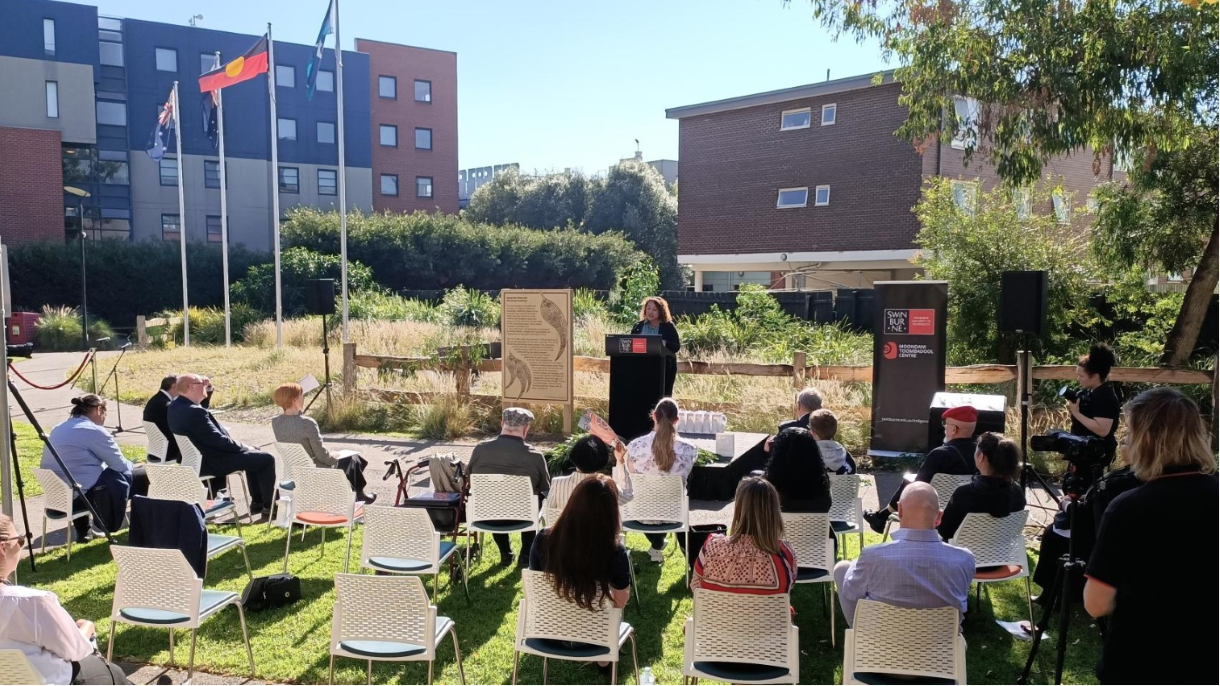Swinburne’s 2020–23 Elevate RAP launched

Swinburne launched the university’s third Reconciliation Action Plan at a ceremony on campus
In summary
- Swinburne and the Moondani Toombadool Centre launched the university’s third Reconciliation Action Plan (RAP) 2020–23
- The Aunty Dot Peters AM Flowering Grasslands were also opened at the event
- The 2020–23 Reconciliation Action Plan is the university’s third RAP and the second to achieve ‘Elevate’ status
Swinburne University of Technology and the Moondani Toombadool Centre have celebrated the university’s latest Reconciliation Action Plan (RAP) at a ceremony at the new Aunty Dot Peters AM Flowering Grasslands on the Hawthorn campus.
The launch event, to be followed by similar gatherings at the Croydon and Wantirna Flowering Grasslands, was attended by Karen Mundine, CEO of Reconciliation Australia, John Kennedy MP, Member for Hawthorn, staff, students and members of the community.
The new 2020–23 Elevate RAP focuses on four key priorities: Aboriginal and Torres Strait Islander self-determination, cultural safety, Aboriginal and Torres Strait Islander knowledges and embedding reconciliation across all parts of the organisation.
The RAP has 120 targets across the seven key themes of leadership and governance, culture, Indigenous staff, Indigenous students, engagement, teaching and learning, and research.
The 2020-23 RAP’s national reconciliation leadership piece is to establish a National Centre for Reconciliation Practice. The Centre will engage with a range of technology-based projects, such as bridging the digital divide, to ensure the success of Indigenous learners in a tech-rich future.
Key targets include appointing Swinburne’s inaugural Pro Vice-Chancellor (Indigenous), appointing more Indigenous academic and general staff, and increasing the number of Swinburne staff completing Indigenous cultural competency training.
Project Lead and author of the 2020–23 RAP, Professor Andrew Gunstone, Executive Director Reconciliation Strategy and Leadership, and Executive Director Moondani Toombadool Centre, says the event was an opportunity to celebrate what had been achieved through the 2017–2019 Elevate RAP and to look ahead to the work still to be done.
“Our 2020–23 RAP addresses the key elements of reconciliation – Indigenous rights, including self-determination, Indigenous knowledges, cultural safety, decolonising and Indigenising, reparative justice, truth telling, relationships and addressing racism,” Professor Gunstone says.
“As we work on implementing our 2020–23 RAP, we need to engage with all these elements in our work. By doing this, we will answer Reconciliation Australia’s call to move from safe to brave and address their theme for National Reconciliation Week 2021 – ‘More than a word: Reconciliation takes action’.”
Swinburne’s Vice-Chancellor, Professor Pascale Quester, congratulated Professor Gunstone for leading this work, and the Moondani Toombadool Centre, the RAP Steering Group and Working Group, and the Swinburne and external communities who have contributed to developing the plan.
“We now have an opportunity to bring this plan to life. I encourage all our Swinburne community to consider how they can embed reconciliation into every aspect of their work, across teaching, research, engagement and more,” she says.
Aunty Dot Peters AM Flowering Grasslands
The event was also the official launch of the Aunty Dot Peters AM Flowering Grasslands. The grasslands on all three Melbourne campuses were designed by Wemba Wemba – Wergaia man Dean Stewart and were organised by the Moondani Toombadool Centre. They are named after Yarra Yarra Elder Aunty Dot Peters AM.
Aunty Dot had a decades-long association with Swinburne, helping to develop the university’s previous Reconciliation Action Plans and progress reconciliation across Victoria. Aunty Dot worked in the community to build understanding and respect between Aboriginal and Torres Strait Islander people and the wider society.
The grasslands were opened by her son, Dr Andrew Peters, and her nieces, Lea Jones and Vicky Peters, who all work at Swinburne, as well as members of their extended family.
Reconciliation at Swinburne
The 2020–2023 Reconciliation Action Plan is the university’s third RAP and the second RAP to achieve ‘Elevate’ status. Swinburne was the first university to achieve this status and is one of only three Australian universities to have an Elevate RAP.
Significant achievements from the 2017–2019 RAP included establishing the Moondani Toombadool Centre, hosting the inaugural National RAP Conference and joining 13 other Elevate RAP organisations to support the Uluru Statement from the Heart, which has been one of the guiding documents behind the 2020–2023 RAP.
Connect with Swinburne’s Moondani Toombadool Centre for all Indigenous matters at Swinburne and download a copy of the 2020-23 Reconciliation Action Plan.
-
Media Enquiries
Related articles
-

- University
The future of fashion: Swinburne launches groundbreaking tech-focused fashion course
Swinburne University of Technology is fusing high tech and high fashion to launch a new forward-thinking Bachelor of Design (Fashion).
Thursday 25 July 2024 -

- University
Swinburne achieves first Cygnet Award through SAGE Athena Swan program
Swinburne has achieved its first Science in Australia Gender Equity (SAGE) Athena Swan Cygnet Award.
Monday 01 July 2024 -

- University
Future of National Institute of Circus Arts (NICA) secured
NICA will transition from Swinburne to the Australian College of the Arts (Collarts), as part of a new agreement that secures the future of circus arts in Australia.
Monday 22 July 2024 -

- University
Swinburne among world’s top 15 universities for scientific impact
Swinburne has been ranked in the top 15 universities in the world for scientific impact across all disciplines, based on the proportion of a university’s papers that belong to the top 1 per cent most cited in the 2024 CWTS Leiden Rankings.
Friday 19 July 2024 -

- University
Opinion: The missed opportunity in the Australian Universities Accord
The Federal Government’s announcement of the Australian Universities Accord Implementation Advisory Committee is welcome, but the glaring omission of dual sector representation is a missed opportunity.
Monday 17 June 2024

